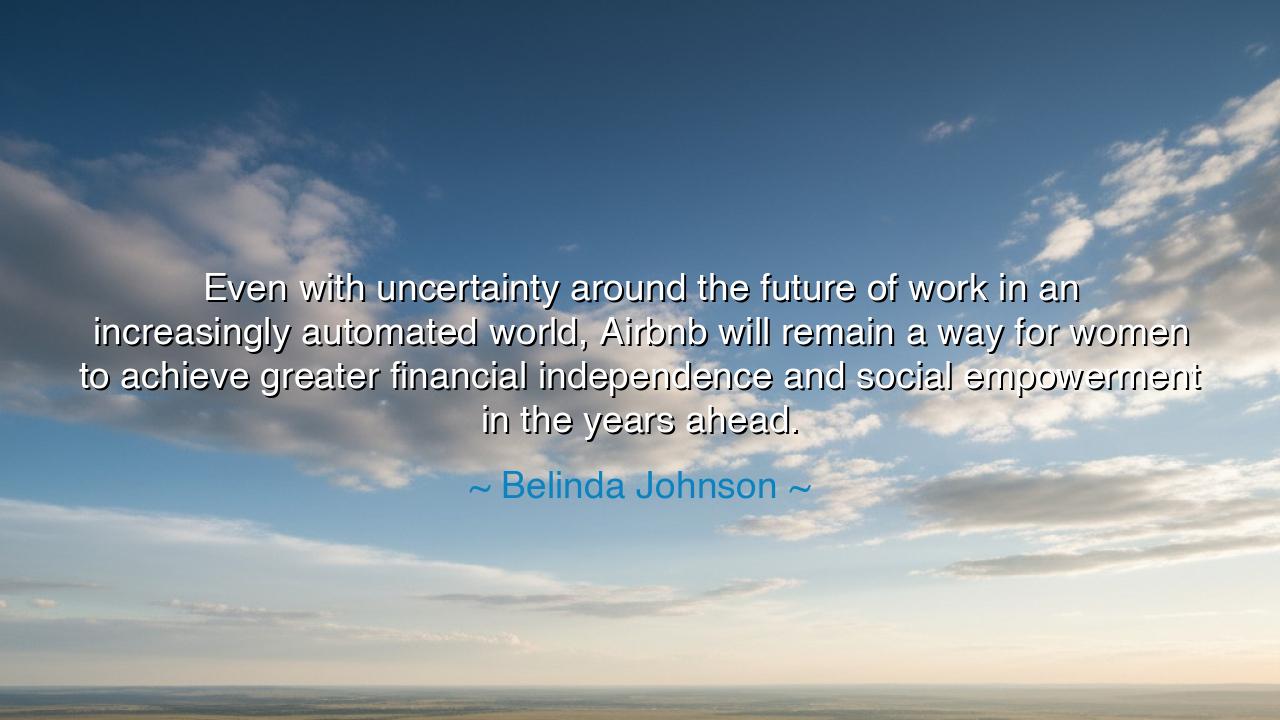
Even with uncertainty around the future of work in an
Even with uncertainty around the future of work in an increasingly automated world, Airbnb will remain a way for women to achieve greater financial independence and social empowerment in the years ahead.






The leader and visionary Belinda Johnson, speaking in a time of transformation and technological upheaval, once said: “Even with uncertainty around the future of work in an increasingly automated world, Airbnb will remain a way for women to achieve greater financial independence and social empowerment in the years ahead.” Though her words are grounded in the language of modern innovation, they echo an ancient truth — that every new age of change carries both fear and possibility, both peril and promise. In her statement, Johnson speaks not only of commerce or technology, but of the eternal struggle for independence, dignity, and the right of every person — especially women — to shape their own destiny.
At the heart of her reflection lies the tension between the old and the new, between the machine and the soul. As the world marches into the age of automation, the nature of work itself is shifting. The tools once held by human hands are now guided by circuits and algorithms. Many tremble before this transformation, fearing that technology will strip away purpose and livelihood. Yet Johnson’s words shine with a quiet defiance, for she sees not the end of human worth, but the birth of new forms of freedom. She reminds us that innovation, when guided by justice and compassion, can serve not as a chain but as a key — unlocking opportunities for those long excluded from power.
Her emphasis on women’s independence carries profound weight. Across history, women have been denied the means to sustain themselves, their ambitions often bound by dependence on systems that were not made for them. But Johnson’s vision is one of renewal — of a world where technology becomes an ally of empowerment rather than a tool of oppression. Through platforms like Airbnb, she sees women gaining control over their own resources, turning their homes into sanctuaries of enterprise, and their labor into freedom. The same walls that once confined them can now sustain them. The home, once a symbol of limitation, becomes a gateway to autonomy.
This is not without precedent in the chronicles of human progress. Consider the story of the women of postwar Japan, who, after the devastation of the Second World War, entered new spheres of work to rebuild their nation. They learned to weave not just fabrics but futures, balancing tradition and innovation to restore both family and society. Or the women of 19th-century America, who, through the rise of cottage industries and education, carved paths toward self-sufficiency and change. In each age, independence arose not from comfort, but from courage — the courage to see opportunity where others saw only limits. So too does Johnson call upon women in this new century to embrace change as the crucible of empowerment.
Her mention of uncertainty is no accident. For uncertainty has always been the companion of progress. When the printing press was born, scholars feared the loss of sacred knowledge; when factories rose, workers feared the end of craftsmanship. Yet each revolution, though it reshaped the world, also expanded it. The tools of one era’s anxiety became the foundations of another’s prosperity. Johnson’s words remind us that what defines us is not the storm of change, but how we sail through it. Resilience, she teaches, is the compass of independence — the ability to adapt without surrendering one’s soul.
Moreover, her invocation of social empowerment reveals a deeper understanding of independence. Financial freedom is but the beginning; true liberation lies in community, in recognition, in the power to participate fully in the world’s story. When women gain independence, they do not rise alone — they lift families, neighborhoods, and generations yet unborn. The wealth they build is not measured merely in currency, but in confidence, education, and the transformation of society’s very structure. Johnson’s vision is not of a world where women merely survive technological change, but one in which they shape its moral direction.
Thus, her words carry a lesson for all who live in uncertain times: do not fear change — master it. Use every new tool, every challenge, as an instrument of freedom. The age of automation need not be an age of alienation, if we remember that machines serve humanity, not the reverse. Let each person, and especially each woman, see in every innovation the chance to build something new — a life, a craft, a legacy. For independence is not granted by the times; it is forged in the will to adapt.
So remember this, dear listener: in every age of upheaval, the wise do not mourn the past — they reimagine the future. As Belinda Johnson foresaw, independence and empowerment are not relics of old struggles but living fires, waiting to be rekindled in new forms. Let your work, whatever shape it takes, be an act of freedom. Let your choices, your voice, your courage, become the foundations of a world where technology serves humanity, and humanity, in turn, honors its highest calling — to live not in fear of change, but in the fullness of self-determination and dignity.






AAdministratorAdministrator
Welcome, honored guests. Please leave a comment, we will respond soon